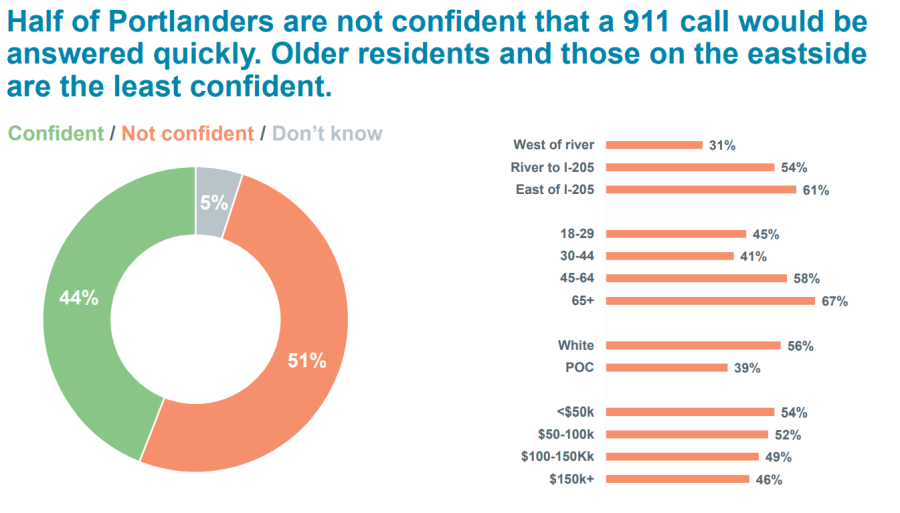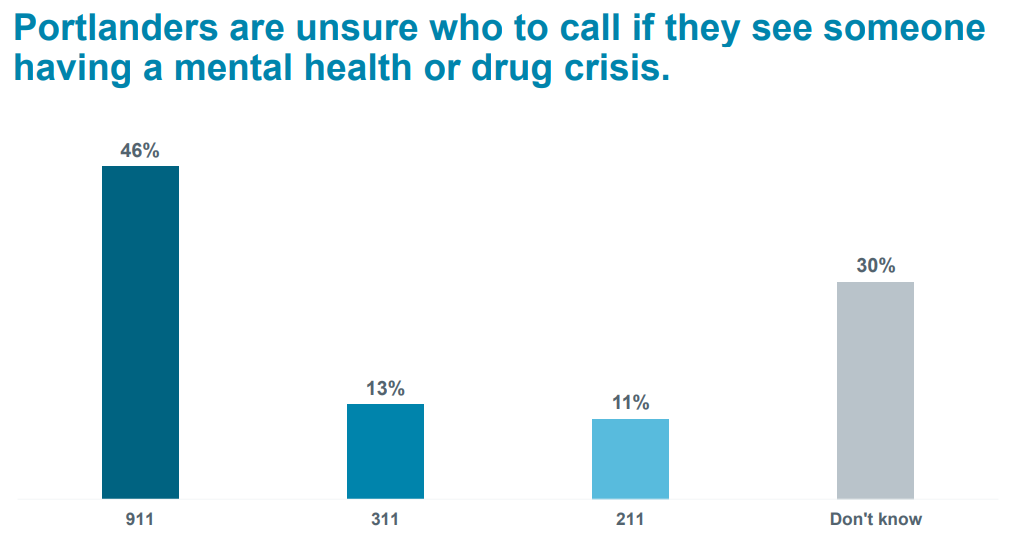PORTLAND, Ore. (KOIN) — Portlanders are afraid of being attacked and encountering people with serious mental health or drug issues when walking alone in their own neighborhoods, a recent study commissioned by Mayor Ted Wheeler’s Office shows.
The local firm that conducted the survey, DHM Research, also concluded that most Portland residents also lack confidence that their 911 calls will be answered quickly in the event of an emergency. And in some instances, they aren’t even sure who to call.
Of the 500 Portlanders who completed the 12-minute questionnaire, 78% said they fear being physically assaulted while walking alone. This fear was especially high among surveyed women, 81% and residents living east of I-205, 82%.
Of the surveyed residents, 71% also said that they were afraid of interacting with people experiencing mental health crises or drug intoxication. Some 60% said they feared gun violence.
These fears are not unwarranted. In 2021, “crimes against persons,” like assault, rape and murder, were up 11% when compared to portland’s previous five-year average, Portland Police Chief Chuck Lovell noted in his 2021 annual report. Portland reportedly also saw a record amount of shooting incidents last year, 1,311, and homicides, 88.
“This report is difficult to read for many of us who are dedicated to public safety in the City of Portland,” Lovell stated in the report. “While 2020 was a year that was unlike any other, we began 2021 with a sense of hope for a new year and the opportunity it brings. Unfortunately, we knew we were starting 2021 on several negative notes. PPB faced a $2 million deficit due to overtime costs associated with the more than 100 nights of civil unrest in 2020 as well as the difficulty we were having to achieve minimum patrol staffing in the precincts — essentially having enough officers to respond to 911 emergency calls for service.”
In the wake of record crime rates, the bureau is also facing a serious staffing crisis, PPB Public Information Officer Terri Wallo Strauss told KOIN 6.
“We have lost 229 sworn members since July 2022,” Strauss said. “We are down to 776 total sworn members [among] all ranks. We have 325 patrol officers to serve a city of 675,000. They all don’t work at the same time—they have days off, leaves, required training, etcetera. In fact, for most shifts, we cannot fill the minimum staffing requirements; officers are no longer taking all the additional overtime. This is the lowest [police staff] any of us have seen in the last 25 to 30 years.”
PPB is working quickly to hire more officers, Strauss said. However, the process has its limitations.
“We are hopeful this will be turning around, but it is going to take some time,” she said. “We have hired 37 officers this year and expect a bigger group next month. However, the backlog at the state academy means anyone we hire right now doesn’t go to the academy until March, or so. That is why we have tried really hard to recruit lateral hires who do not have to go to the state academy.”

Portlanders’ concerns about emergency calls not being answered quickly enough are also based in reality. Strauss said that the Bureau of Emergency Communications, which is responsible for handling Portland’s 911 and non-emergency lines, is also dealing with staffing shortages.
“They, too, have been vocal about their staff shortages and the longer wait times, especially in regard to non-emergency [calls],” she said. “They are staffing up and I know they are working on solutions to divert some of the calls to non-emergency to more appropriate lines.”
Knowing what line to call when is also a problem for some Portland residents. According to the survey, 30 percent of people were unsure who to call when someone is having a mental health or drug crisis. Info on who to call in various circumstances is available on the city’s website.

Despite the ongoing communications issues, 78% of polled Portlanders said that they would report a crime to the police. An even larger number of Portlanders (83%) said they would work with PPB to identify a person who committed a violent crime.
These numbers were lower among younger demographics. According to the survey, 30 percent of residents 18 to 29 said they would not report a crime to the police. From this group, 20 percent also said they would not work with police to identify someone who committed a violent crime.
“Chief Lovell has talked a lot about the need to gain community trust, but also he is thankful for the support police are receiving,” Strauss said. “We hear daily from community members who want and expect police services and we continue to try to respond as best as we can. He has also talked about the need for community policing, but recognizes with our staffing issues, officers have little time to build those relationships. We are thankful for the community members who engage in public safety, by either coming to our precinct meetings or serving on our many advisory councils.”
The mayor’s office said that Wheeler intends to use the data expressed in this survey to address community concerns and unite city commissioners on future projects.
“We commissioned this poll to better understand Portlander’s priorities so we can work to address these concerns,” the mayor’s office said. “This data showed us much of what we already knew — Portlanders want increased action along our priority areas: homelessness, community safety, shared economic prosperity, and livability.”
